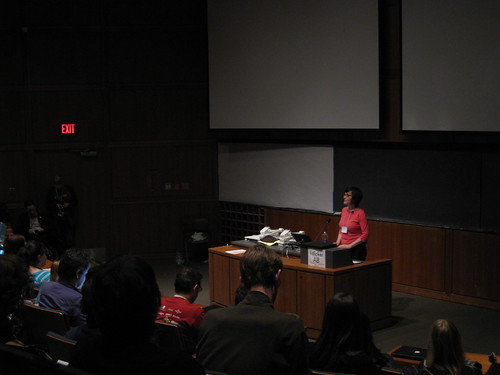Northern Voice 2009 Keynote Nora Young
byWelcome to day two of Northern Voice 2009 we have two keynotes this morning and the first is Nora Young (from Spark on CBC Radio) to discuss On Buried Hatchets and Better Tomorrows discussing a new ecology of information for content creators, from mainstream media to online publishing.
Update: When new technologies arrive there is a culture shift. Nora’s first example is the telephone and how it changed the way people communicate — from small things such as what do you say when you first pick up the phone?, “ahoy” got a nice round of chuckles.
Spark is about technology and culture so the intersection with social media was a great fit for Young. Along with a colleague they came up with tips for mainstream media based on social media such as transparency. “Mirror the more open, loose, and character of a blog,” asking, “what would a blog sound like on the radio?”.
“We deliberately try to show that we’re not live, and we’re not perfect — which isn’t too hard to do — but we try and let the seams show.” Nora’s presentation is peppered with great archived audio as well.
Another tip for mainstream media based on social media thinking is to “give up on the idea of being the sole authority.” They “try to bring the idea of a perpetually unfolding conversation into the program.” She says they are also very open about the fact that some of the best ideas come from the Spark community and those who enjoy the show. “Have integrity in your desire to foster community.”
Update: “There are some real, practical and esthetic challenges,” for mainstream media in order to shift to this kind of thinking.
“It’s not what you know but who you know, we’re living in an age of socialized information,” Nora uses Twitter as an example of this, “it’s becoming a fantastic tool for information gathering and dissemination.” With Spark they also put out questions, share information and engage their audience even more.
Nora also mentions that it’s a collaborative truth meaning “the contribution of the individuals is important but not an important as the sum total,” which she notes as a really big change. “The culture of the book which is linear and individual to the culture of the web.”
Update: “Mobiquity: being continually connected in the mobile web,” is another shift Nora mentions. When more people connect to the internet from their phones than desktop computers what does that mean for content and the way blogs are viewed? (Editor’s Note, check out Brave New Code‘s WPtouch plugin if you’re on WordPress — it makes your blog look amazing from a mobile device).
What happens when you have perpetual internet connectivity? The web isn’t detached from geography, it can be hyper-local, mentions Nora.
“It’s not just about the technology it’s about all the layers of social organization,” Nora gives an example of her local farmer’s market and how she likes to get eggs from the egg lady. If they market were totally connected and she was aware that the egg lady would not be at the market that day she probably wouldn’t have ventured out. However she didn’t know, she did go, and she had a great experience — which she could have missed out on if she had all the information re: the egg lady. (There are some negative implications of being *too* connected…)
She moves on to sustainability, what people want versus what people say – closing the gap, “so there’s a better marriage of information,” so that “consumers can now contribute information about what they want in a product and designers can get that.”
Example of a participatory culture in business is the stock photo industry and how the model for stock photos no longer exists with sites like Flickr.
“Who the hell has time for all of this?” Nora notes that, “If you can make things simple and elegant people will spend a lot of their own volunteer energy to figure things out.” (Editor’s Note: Yay open source!)
Flipping information sharing on its head Nora gives an example of a class where the teachers sent the kids home with video podcasts in order to get the info and learn then when the kids came to school, the personal face time was to interact, work, and discuss what they learned.
Update: How do we find spaces for deeper shared learning? At the bare minimum, Nora says this means we have to push for information access, and we need to remember what all of this collaboration is for.









1 Comment — Comments Are Closed
Great website, well researched and well written, thanks for sharing.